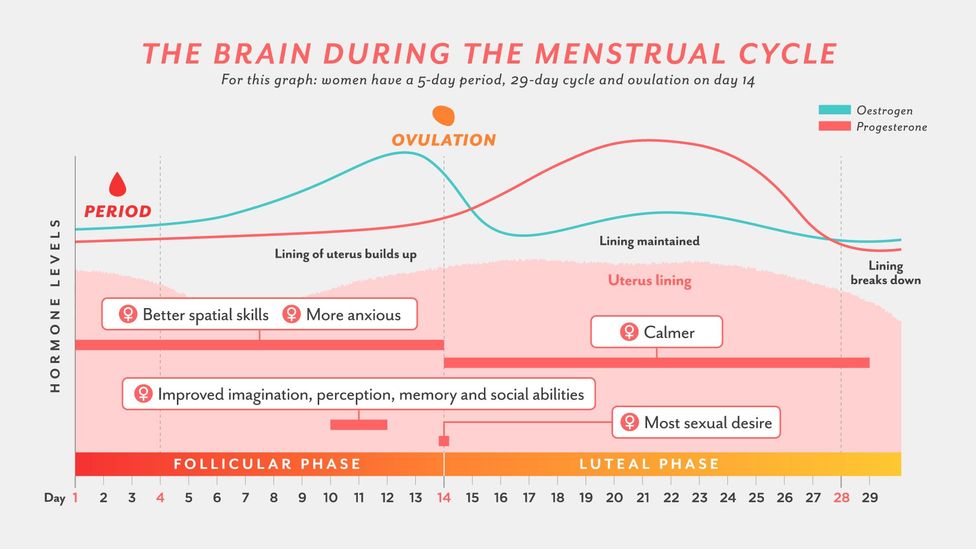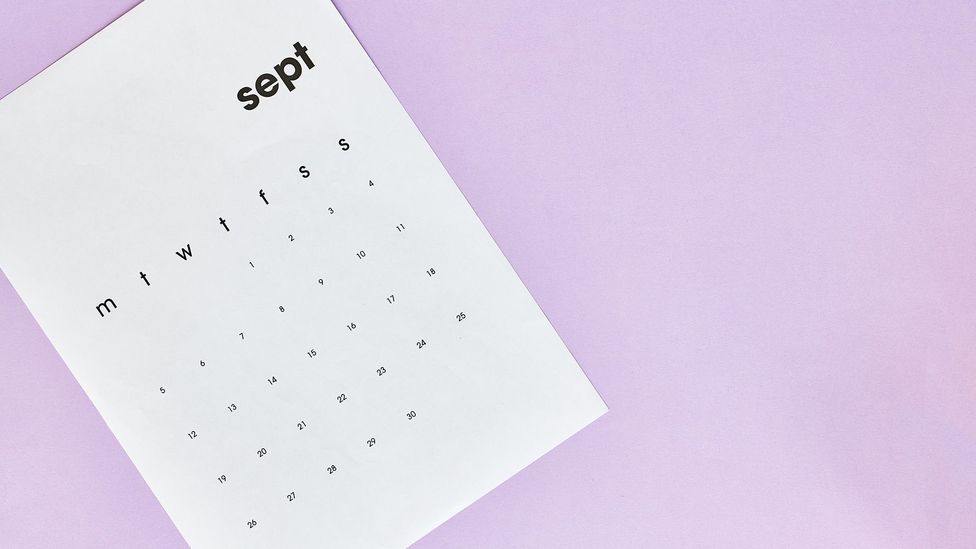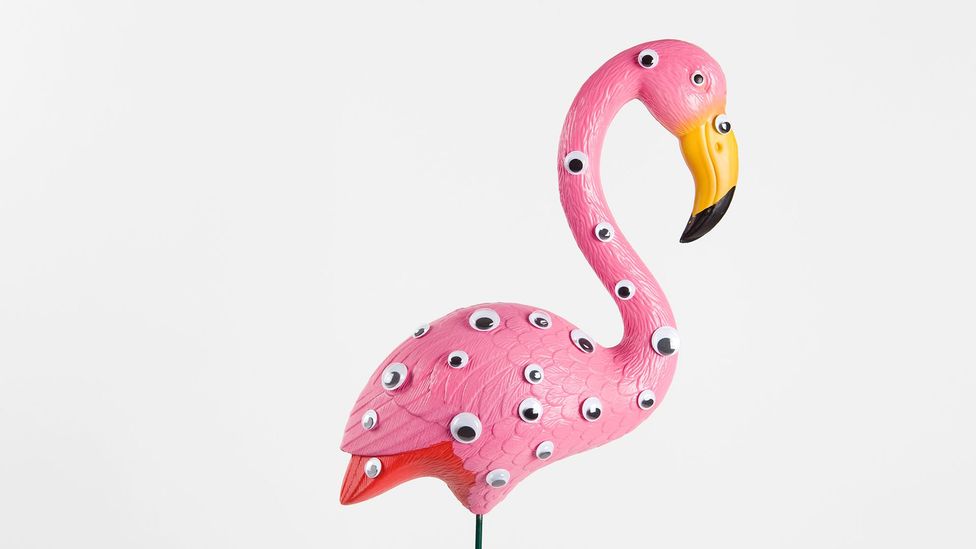If I Finally Get My Period Does That Mean Im Ovulating Again
How the menstrual cycle changes women'due south brains – for amend
(Image credit:
Getty Images
)

Right later a period, women accept better spatial awareness. Three weeks after, verbal skills top. It turns out the monthly bicycle does change the brain – but not in the ways you think.
In the beginning, in that location was 'hysteria'. From the medical magicians of ancient Egypt to the disguised philosophers of Classical Hellenic republic, men have pondered this condition for millennia. The tell-tale signs were extremely broad, including feet and erotic fantasies, but i thing was clear: it only happened to women.
Plato believed hysteria was caused past the mourning womb, which was sad when it wasn't carrying a child. His contemporaries said it arose when the organ wandered around the body, becoming trapped in dissimilar body parts. The latter belief persisted well into the 19th Century, when the disorder was famously treated past bringing women to orgasm with early vibrators.
Even today, the notion that a woman's biology tin befuddle her brain is a staple of popular civilisation. If a adult female is moody, she'south asked if information technology's 'that time of the calendar month'. If she's feeling sexual, she's told she might exist ovulating.
You might as well similar these other stories in the Health Gap:
• Why does Alzheimer's hit women harder?
• The enduring mystery of migraines
• The wellness risks of maturing early
Information technology turns out this isn't unfounded – some women really do feel more anxious and irritable around their menstruation, and it's true that we're more motivated by sexual practice around the time an egg is released. (Of course, that isn't to say that symptoms tin always, or commonly, can be explained this way; it's important to think that the tendency to attribute women'south complaints to conditions like 'hysteria' tin can have dangerous results.)

Some women do feel more anxious around their catamenia – but other effects of the menstrual cycle are more positive (Credit: Getty Images)
Just what's not widely known is that the menstrual bike tin can bear on women'south brains in positive ways, too.
It turns out that women are more than adept at sure skills, such as spatial awareness, after their period. Three weeks after, they are significantly ameliorate communicators – and, oddly, peculiarly practiced at telling when others are feeling fearful. Finally, for office of their cycles their brains are actually bigger. What's going on?
(Click the below graphic to enlarge)

Throughout the menstrual cycle, the brain changes – as does everything from spatial skills to sexual desire (Credit: Yoko Miyagawa/BBC)
Instead of rogue wombs, the main source of these changes is the ovaries, which release oestrogen and progesterone in different quantities throughout the month. The hormones are primarily tasked with thickening the lining of the womb and deciding when to release an egg. They as well have profound effects on women's brains and behaviour.
Scientists have been studying the menstrual cycle since the 1930s. It'south a surprisingly popular research topic, and we at present know that it has all kinds of quirky effects, from influencing a woman'south ability to give up smoking to the types of dreams she has each night.
But this mountain of noesis wasn't born out of a fascination with female biology. Instead, information technology was driven by a want to sympathise the ways in which men and women are different – and why.
One instance of this deviation is in our brains. The physical differences between the sexes extend to these wrinkly organs, and scientists have suspected for years that they are down to hormones. "Basically nosotros jump on these natural fluctuations in sex activity hormone levels that we observe," says Markus Hausmann, a neuroscientist at the University of Durham. "This might exist the menstrual cycle in women, or seasonal fluctuations in testosterone levels in men. It's a full natural experiment."

Hormones fluctuate seasonally in men and monthly in women (Credit: Getty Images)

Women have amend verbal skills than men, possibly an evolutionary effect of needing to convey information to their children (Credit: Getty Images)
This social reward is thought to accept evolved because, thousands of years ago, clear mothers would have been better at conveying vital information to their children – such as not to eat certain poisonous plants.
Simply are hormones involved? And if then, how much?
Hormonal balance
Back in 2002, together with colleagues from the Gerontology Inquiry Center in Baltimore, Maki gear up out to larn how fluctuating oestrogen levels affect women'south abilities over the form of each month. Each participant was assessed twice: once just after their catamenia, when oestrogen and progesterone levels were low, and once nearly a calendar week after they ovulated, when oestrogen and progesterone were high.
It was a modest study, involving sixteen women who were asked to complete a range of mental tests. Just the findings were notable.
During days when the participants had more than female hormones in their systems, they were significantly worse at the things men are usually good at (like spatial awareness) and much better at the things women tend to have an edge in (such as the ability to come up with new words). When their hormone levels were lower, their spatial awareness was restored.

After their period, women accept improved spatial awareness – a trait men normally tend to be better at (Credit: Getty Images)
One ability that improved when female person hormones was higher was 'implicit remembering', which Maki describes equally the hidden, effortless kind of memory. "If I said to yous, 'Oh, what was the last Uber fare you had – was information technology more or less than the Lyft fare?' And so later on, I asked you, 'How do you lot spell fare?'. You might spell it f-a-r-east, fifty-fifty though most people spell it f-a-i-r. Because somewhere your brain encoded 'fare' and that was heightened."
These implicit word memories are important for developing communication skills. They're the reason we often detect ourselves using obscure words or turns of phrase, like "Oh, he was so obstinate", but later on hearing someone else use them, or reading them in an article.

When written report participants had more female hormones in their organisation, they were better at coming upward with new words (Credit: Getty Images)
Every bit a result, Maki believes these monthly changes were primarily driven past oestrogen.
The hormone affects two neighbouring encephalon regions. The kickoff is the seahorse-shaped hippocampus, which is involved in storing memories. Evidence is mounting that the hippocampus is vital to social abilities, since beingness able to call up your own experiences can help you to sympathise the motivations of others. The region gets bigger each month when more female hormones are floating effectually.
The second is the amygdala, which helps us to procedure emotions, especially fear and the conclusion to fight or abscond. Intriguingly, the amygdala also may be crucial to avoiding social blunders, because understanding why a person is fearful – and deciding if we should exist likewise – requires united states to see the world from their perspective. Once you have this ability, you tin can apply information technology to your reward in other ways, such as to brand moral judgements or even tell lies.

When they have more female hormones in their systems, women tend to be amend at seeing a situation from someone else's perspective (Credit: Getty Images)
Equally information technology happens, women's abilities to recognise fear height with their oestrogen levels each month. If the hormone is responsible, information technology likewise might help explain why women tend to accept amend social skills overall. The idea is backed up past the fact that women who lack the ability to produce oestrogen aren't as good at recognising fear and tend to have poor social skills.
Maki believes that almost of the effects our menstrual cycles accept on our minds are sheer accident. For years, researchers thought that some monthly changes had an evolutionary advantage, such as the widely-reported discoveries that women prefer more masculine, symmetrical men when they're at their most fertile. Simply this isn't actually true – several large-scale studies haven't found whatsoever link.
Brain power
Just regardless of why information technology exists, the monthly transformation of women's brains could withal be an advantage.
The reason lies in another major deviation betwixt male and female brains. The latter tend to be less 'lateralised' – rather than using just one side of the brain to complete a job, like solve a maths problem, women are more than likely to employ both.
These left-right divisions are relatively stable. "Most people prove a lateralised effect when information technology comes to the easily," says Hausmann. "So for example, I'chiliad right-handed. This tells us something most where linguistic communication is located in my brain. More right-handers accept language localised in the left side of the brain than left-handers." This specialisation is thought to exist useful, since most species – from lungfish to lizards – have brains built this way.

Women are more probable to employ both sides of their brains, which may lead to more than flexibility in thinking (Credit: Getty Images)
Why women's brains are less and so is a big mystery. But this fluctuates, likewise. Dorsum in 2002, Hausmann discovered that – as with other 'female person' traits – a woman's tendency to use both sides becomes more extreme when oestrogen and progesterone levels increment each month. One possible reward is that these shifts allow for more flexibility in thinking.
"When people take a dissimilar design in their brains over the class of the month, with them becoming more or less lateralised, this could atomic number 82 to unlike strategies of how to solve a particular problem," says Hausmann. "So people who rely more than on the left hemisphere may solve problems in a more logical way, and people who rely more on the correct hemisphere mayhap rely more than on holistic processes when they try to solve a task."
The next time someone asks if you're hormonal, you can say yes – but it isn't necessarily a bad matter.
This story is part of the Health Gap , a special series nearly how men and women experience the medical system – and their own health – in starkly unlike means.
Do y'all take an experience to share? Or are you simply interested in sharing data virtually women's health and wellbeing? Join our Facebook group Future Adult female and be a part of the chat nigh the day-to-day issues that touch on women's lives.
Join 900,000+ Future fans by liking us on Facebook, or follow usa on Twitter or Instagram.
If yous liked this story, sign upward for the weekly bbc.com features newsletter, called "If You Simply Read 6 Things This Calendar week". A handpicked selection of stories from BBC Futurity, Culture, Capital, and Travel, delivered to your inbox every Friday.
Source: https://www.bbc.com/future/article/20180806-how-the-menstrual-cycle-changes-womens-brains-every-month
0 Response to "If I Finally Get My Period Does That Mean Im Ovulating Again"
Post a Comment